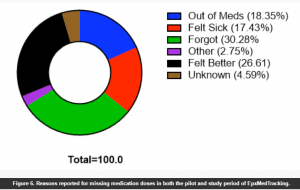Research proving the Epharmix medication adherence platform published in JMIR-RP
May 25, 2017 at 1:21 PM
Medication adherence leads to better health outcomes and healthcare cost savings, yet patients often do not complete therapy. Every patient faces unique challenges, so the reasons why were varied and unknown, and providers had no way of quickly addressing those reasons, until now.
The study, published in the May 2017 Journal of Medical Internet Research- Research Protocols (JMIR-RP) was conducted by researchers at the Washington University School of Medicine. They tested our medication adherence platform, EpxMedTracking, for its ability to identify and address patient reasons for non-adherence using two-way messages between patients and providers. The publication of this research represents a milestone for Epharmix and the clinical validation of our healthcare technology.
To date, the EpxMedTracking system is the first SMS-based intervention to both provide medication reminders and identify problems leading to medication nonadherence, while simultaneously facilitating two-way communication between patients and their care team.
Unlike many other telemedicine interventions, the EpxMedTracking system also has the added strengths of being highly accessible for even the most socioeconomically disadvantaged patients as the system is inexpensive to operate and all messages are free to patients. The messages are accessible by anyone with a landline or cell phone and no smartphone is necessary.
"Our study using the Epharmix platform has highlighted the beneficial effects of digital technology, specifically SMS text messaging, in improving medical treatment adherence in a variety of clinical settings. This represents a critical breakthrough in promoting chronic disease self-management and reducing health disparities among populations at risk for poor health," said Dr. Will Ross, Principal Investigator and Professor of Medicine at the Washington University School of Medicine.
The data suggest that the EpxMedTracking system is well received by patients as demonstrated by the high engagement rate of 85.9% observed throughout the study period. This engagement rate remains high across the 11-week study period and never drops below 75%, indicating the EpxMedTracking intervention may be an effective tool for the longitudinal management of medication adherence in chronic conditions, which as mentioned previously, are particularly susceptible to non-adherence.
There were 109 reported missed doses. The causes for missed doses in order of frequency were “I forgot” at 33 events (30.3%), followed by “I felt better” at 29 events (26.6%), “out of meds” at 20 events (18.4%), “I felt sick” at 19 events (17.4%), and “other” at 3 events (2.8%). No patients responded with “I am no longer taking.” An additional 5 missed doses occurred where the patient responded that the medication was not taken, but they did not respond why. Such events are labeled in the chart as “Unknown.”

A distinct strength of our system seems to be detecting when there is an actionable problem with a patient’s regimen as 62.4% of the missed doses were due to “out of meds”, “felt better”, or “felt sick." Importantly, this indicates that the EpxMedTracking system can be used to direct provider attention to where it is both needed and most useful, thus making it well suited to improve the efficiency of provider time and clinical outcomes in a wide range of disease states where non-adherence may be an issue.
Researchers also noted an overall increase in self-reported medication adherence in patients using the EpxMedTracking system during the study period.
______
Learn more about Epharmix by trying the demo
MobiHealthNews coverage of the research



